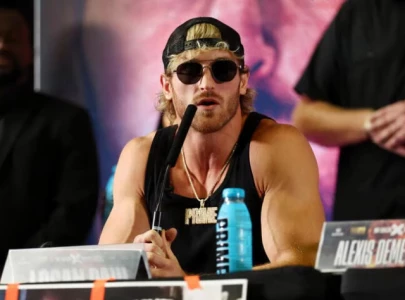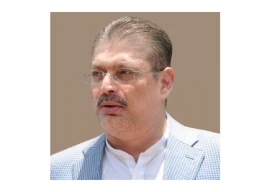
The alleged mastermind of the 2008 Mumbai attacks on Saturday challenged India’s refusal to allow Pakistani lawyers to cross-examine Indian witnesses in the case.
An eight-member commission comprising defence lawyers, prosecutors and a court official was allowed to travel to India on March 15 to gather evidences for the prosecution of seven suspects linked to the 2008 Mumbai attacks. However, the defence lawyers were barred from cross-examining the four prosecution witnesses in the case. The counsel for the commander of the banned Lashkar-e-Taiba Zakiur Rehman Lakhvi, who is also accused in the case, Khawaja Haris Ahmed told the Anti-Terrorism Court - 1 (ATC-I).
ATC-I Special Judge Shahid Rafique adjourned the case hearing till May 5.
Lakhvi’s counsel argued that under international laws they have the right to question witnesses in the case, which include Chief Investigation Officer Mumbai Ramash Mahale; Rama Vijay Sawanth, the magistrate who recorded the confessional statement of Ajmal Kasab (the only attacker captured alive by the police); and Dr Shaliesh Mohiti and Dr Ganash Dhondiraj, who conducted post-mortems of 166 people killed in the attack.
However, Ahmed maintained that the Indian Special Public Prosecutor Ujjwal Nikam, who was deputed to facilitate the Pakistani judicial commission, stopped the defence lawyers from questioning the witnesses. Nikam had claimed that both the governments had already agreed in November 2010 that no cross-examination of witnesses will be carried out by Pakistani lawyers, said Ahmed.
“In the eye of law, the proceedings and recording of the statements of the Indian prosecution witnesses without examination by Pakistani lawyers had no legal bearing in Pakistan’s trial court,” Lakhvi’s counsel argued. He said that both Indian and Pakistani prosecution had not submitted any such agreement, adding that if such an agreement existed it holds no legal value, as the defence counsel cannot be deprived from the right to cross-examination.
The defence counsel urged on the court not to admit the statements of the Indian witnesses review records.
Published in The Express Tribune, April 29th, 2012.
COMMENTS (17)
Comments are moderated and generally will be posted if they are on-topic and not abusive.
For more information, please see our Comments FAQ



1725612926-0/Tribune-Pic-(8)1725612926-0-165x106.webp)













@Lala Gee, We pity Pakistan and citizens like you, who are dragging the country into mess.
As I said on numerous times in my comments that Indian are different species with whom fact, logic, and reasoning doesn’t work.
Well our fact logic and reasoning works with world, except for Pakistan. So its you guys who behave like aliens.
Regarding evidence, your govt itself admitted that Pakistanis were involved. your TV channels admitted. Your defense is they were non state actors(as always).
Ok there may not be a smoking gun against Hafeez Saeed but he has been named by Kasab and David Headley. Why not further investigate
The issue is that the conspiracy was hatched in Pakistan, voice samples are there... it is is a matter of doing honest investigation.Any other country would have done so. But we know it is difficult to go after your own assets.
Live in denial, at the end of the day it is only harming Pakistan.
@jerseybb: With the exception of Ajmal kasab who has been convicted guilty, all others are citizens of India. Pakistan did not accept Kasab as its citizen for a long time, even claiming that Kasab cannot be a Pakistani name. Kasab's father himself admitted to the media that it was his son but still Pakistan continued on with its lies. Kasb asked for legal representation from Pakistan. He appealed openly on the video and also sent written appeals to Pakistan Embassy and Pakistan Government. Pakistan stuck to its earlier lies and did not provide him legal representation. Had Pakistan owned him up earlier and provided legal assistance, they could have not only cross examined Kasab but all other witnesses as well. Pakistan could have also called their own witnesses and examined all evidences.
@jerseybb:
".... later is Pakistani citizen and former is Pakistani citizen as well...."
Which one of these witnesses that Lakhvi's counsel wanted to cross examine is a Pakistani Citizen?:- Chief Investigation Officer Mumbai Ramash Mahale; Rama Vijay Sawanth, the magistrate who recorded the confessional statement of Ajmal Kasab; and Dr Shaliesh Mohiti and Dr Ganash Dhondiraj, who conducted post-mortems of 166 people killed in the attack. Do tell!!
To the idiots out here coming up with the idea Pakistan should not be allowed to cross examine the witness as they can't question Hafiz Saeed etc, later is Pakistani citizen and former is Pakistani citizen as well, if Hafiz Saeed was indian you can take him with you who cares?
Nothing prevented Pakistan within days of the event from asking its High Commissioner in Delhi to meet the lone surviving terrorist to ascertain his antecedents & then arrange his defense by cross examining his denouncers.The man did not even respond to letter of Ajmal Kasab seeking help. Nothing prevented Gen Pasha from travelling personally (or send his nominee) to Delhi as indicated by Pak Prez soon after the carnage to join the investigation. Such inaction then made one to draw adverse inferences. After denying the entire episode for almost four years what is the point of cross examining doctors who conducted post mortem on 160 bodies or the magistrate who took the depositions? Nobody in Pakistan other than the incorrigibly naive or endearingly patriotic would be fooled by this.
@All Indian Trolls:
Please come out of Self-pity disorder. The quality of your so called evidence against the Hafiz Saeed et-al compelled USA to announce a bounty of US$ 10 million for the person providing "evidence" of his involvement in Mumbai attacks. As I said on numerous times in my comments that Indian are different species with whom fact, logic, and reasoning doesn't work. You tell them the facts and they will ignore them, try to reason with them and they wouldn't listen but keep repeating the same rhetoric.
@Awais: The same info that India has provided PAK has been sent to all the major capitals of the world. None one them has rejected it as fabricated including your higher than blah blah and lower than blah blah friend. That is the reason China named PAK after the attack in Xizang. They have already given you TWO warnings.
@what freedom?:
Sure, Pakistan should just say yes Sir to all the Indian fabricated stories about the Mumbai drama and lets live in the wonderland.. right? Give us a break guys... and at least try to be reasonable!
@ Truth Hurts, oh God...How can you say that the whole episode is sponsored Hindu militants when the whole things are brazen to show that it was masterminded by terrorists based @ Pakistan. I wonder how some of the citizens of Pakistan involve in this type of reasoning..My pity to you...
@ Freedom: For India, the State and Non-state actors (whatever you call them) are accomplice to the crime committed by ten terrorists on Indian soil. The International community desire Pakistan to take action against Mumbai carnage culprits themselves or hand them over to the country where crime against humanity is committed. To India, Pakistan is shielding the culprits and hence itself is accomplice to the crime. Pakistan is not permitting Indian or any other international agencies for collection of evidences within its territory (for obvious reasons). To establish crime evidences are to be dig in Pakistan. They are not available on platter. Same was the case with OBL, when US did not trust and went alone.
In view of above, the judicial commission (as you call the visiting Pakistani officials) is allowed access, to records and persons, considering them ‘representative of accomplice in crime who is on parole’. The access to Indian judicial records is open and is provided to accused as also his accomplices in crime for their defense. This is only for their (or their citizens’) defense before Indian Courts or for International community. Please realize it.
Lol, how can they let them cross-examine them, when they know the truth will come out, and this whole drama will be exposed!! Whole drama created by Hindu Militants!!
We know what happened with the mock trial of Rinkle. So you should not be complaining!
@Roperia, How can anyone not mock this trial when the evidence provided by India is a joke? Conspiracy theories cannot be used as evidence, sorry.
@freedom: we knew it, pakistan will come up with such acrobatcs. imagine, how much pakistan will jump once they get access to witness. a single spelling mistake, and lo, the whole case will be projected as false. in fact the purpose of this whole exercise was to find some fault, even thin as hair, so that pakistanis can claim the case is false. this is called 'Chuzpah'. its good Indian govenment knew their intention and didnt gave access.
@Roperia these are all lame excuses. Whats wrong in cross examination?
The way Pakistani judicial system has mocked the trial of these mass-murderers by pretending to be defending the civil rights is despicable. I'm not surprised though, just read Anton Lieven's book - Pakistan: A Hard Country where he writes that radicalization has seeped into the Pakistani judicial system (especially Punjab). I'm reminded of Hilary's famous remarks to Pakistan - "Snakes in your backyard won't bite only neighbours!". Terror as a tool of FP is successful only in as much as reminding all of Pak's neighbors that it is a notorious (and in India's case - suicidal) state but any illusions of achieving any objective must be put to rest by familiarizing oneself with the relative position of India and Pak on the world stage.